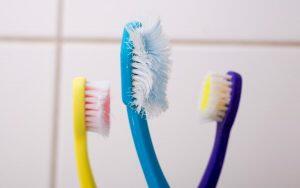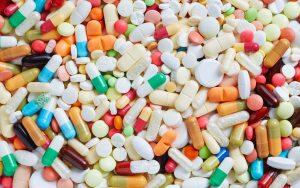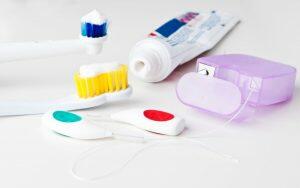Happy Valentine’s Day!
If you have a special Valentine in your life, you’ll likely be celebrating Valentine’s Day 2021 at home this year, since many restaurants are closed to in-person dining due to the COVID-19 pandemic. But that doesn’t mean you still can’t have a romantic evening. Take-out dinner, flowers, chocolates, snuggling up on the sofa to watch a movie… er, wait, on second thought…
If you are not wanting to get too close to your Valentine sweetie because of bad breath, maybe it’s time to do something about it so you can get back to snuggling.
Causes Of Bad Breath
There are so many things that can cause bad breath, or ‘halitosis’ in medical terms, and it’s hard to know where to start to list them all. But while it may make it easier to understand that bad breath is common among many people, it’s best to know the causes. Let’s dive in.
Poor Dental Hygiene Habits
This is the most obvious, and perhaps the most common, reason why people have bad breath. We may think we are doing a great job with our oral hygiene because we brush twice a day, and most days) we remember to floss between our teeth.
But if our twice-a-day brushing technique is flawed, or we are using an old toothbrush with flattened-out bristles, we may not be doing the bang-up job we think we are. In fact, things like using an old toothbrush with flat bristles can actually do more harm to your teeth than good.
And if you aren’t brushing properly, or often enough, and aren’t flossing regularly, chances are you’ve got food particles and debris stuck between your teeth and gums. That’s yucky in itself. But imagine what happens to those particles after they sit there between your teeth for days (or weeks) on end. Yep, bacteria settles in. And not the good kind of bacteria that you want in your mouth — nope, it’s the bad actors who move in and set up shop in your oral cavity to start feeding on those rotting food scraps in between your teeth. Double yuck!
This process eventually leads to tooth decay, cavities, maybe even gum disease. And just as decaying food scraps sitting on your kitchen counter will start to smell, the decaying food particles in your mouth will do the same thing, leading to bad breath. So maybe it’s time to take a closer look at those dental habits and see where you can make improvements:
- Buy the best toothbrush you can afford (electric models tend to get more of those food particles out from between your teeth)

- Fork out a few pennies each month for dental floss — and then USE IT!
- Rinse with an antiseptic mouthwash twice a day, and after each meal if you can, to reduce bacteria growth (use alcohol-free mouthwash, as alcohol dries out your mouth and is a major contributor to bad breath)
- Use a tongue scraper to gently scrape the top of your tongue, as well as underneath
- If you have braces or wear dentures, make sure you are following your dentist’s instructions on proper cleaning techniques (we’re happy to provide a refresher course if you need it)
These steps will make an immediate difference in the freshness of your breath, while you look at other factors that may also be contributing to the problem.
Diet And Lifestyle
We all know the common food culprits that, when consumed, cause bad breath, like onions and garlic… that’s obvious. (So maybe avoid the Caesar salad for dinner on Valentine’s Day…)
But what you may not realize is that certain dietary ways of eating can unknowingly lead to dry mouth, which is an exacerbating factor for bad breath. For example, diets that are high in protein and low in fiber can result in dehydration and reduced salivary flow, which leads to dry mouth, which contributes to bad breath.
The most important function to pay attention to here is the flow of saliva in your mouth. Saliva keeps food particles moving and helps prevent them from settling in between your teeth. So if you are following a diet or eating plan that results in a consistently dry mouth or excessive thirst, this may very well be to blame for your bad breath.
Besides your dietary habits, your lifestyle choices can be a factor in your bad breath also. Smoking for example, leads to a whole host of health problems and issues, not the least of which is chronic bad breath. Imbibing alcohol regularly can cause bad breath as well, as alcohol is dehydrating and results in a dry mouth.
So… lay off the onions and garlic (at least on Valentine’s Day), quit smoking, reduce your alcohol consumption, and make it a habit to drink lots and lots and lots of water — the general rule of thumb is to drink half your weight in ounces of water every single day — which will increase your salivary flow and keep those nasty food bits from taking up residence in between your teeth.
Medications
Here we go with dry mouth again. There are many medications which have the unpleasant side effect of slowing down your saliva flow, leading again to dry mouth, which causes excessive thirst and bad breath. Medicines like calcium blockers, blood pressure pills, antihistamines, cardiac medications, psychiatric drugs, and even some vitamin supplements, are common culprits.
It’s not a solution that you stop taking these medications, but understanding that they may be the cause of your chronic bad breath can empower you to take action to combat these side effects. Again, drink lots of water each day — there is nothing better with which to hydrate your mouth and body than water — and this, together with the dental hygiene improvements from above, should help immensely to improve your bad breath.
Medical Conditions
Certain medical conditions or diseases can also be the cause of bad breath, including:
- Kidney disease
- Liver disease
- Some cancers
- Metabolic disorders
- Uncontrolled diabetes
- Acid reflux (GERD)
- Sinusitis
- Post-nasal drip
- Allergies
- Throat and lung infections (such as bronchitis)
- Periodontal (gum) disease
- Tooth decay
- Abscessed teeth
- Impacted teeth
For some of these conditions, it may be the required medication required which is causing dry mouth and leading to bad breath. For others, it may be the condition itself causing your halitosis. Talk to your doctor for suggestions on what you can do to mitigate this side effect.
And if you are suffering from any of these conditions: periodontal or gum disease, tooth decay, abscessed teeth, or impacted teeth, come see us right away. Bad breath caused by any of these dental conditions should be treatable in the dentist’s office.
If you know you suffer from bad breath and suspect a dental issue is to blame, please don’t let embarrassment keep you from reaching out for help. Dentistry is what we do, and improving bad breath is all in a day’s work!
So this Valentine’s Day, follow these tips and recommendations and enjoy that cuddle on the couch with your sweetie! (Just don’t forget to brush after the chocolates…)
Happy Valentine’s Day from Bradford Family Dentistry!

